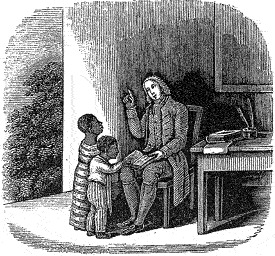|
Home
|
Slavery
|
Abolition
|
Equiano
|
Sancho
|
Cugoano
|
Places
|
Bookshop
|
Contact
|
Site Index
|
|
Quakers and Slavery, 1657-1865:
|

|
|
This major international, interdisciplinary conference, held in November 2010, examined the history, literature, and culture of the Quaker relationship with slavery, from the society’s origins in the English Civil War to the end of the American Civil War. This page maintains an archive of the conference programme.
Quakers and Abolition, a collection of essays arising from the conference, will be published by the University of Illinois Press on 30 March 2014, co-edited by Brycchan Carey and Geoffrey Plank. Click here for more information. In 1657, George Fox wrote “To Friends beyond sea, that have Blacks and Indian Slaves” to remind them that Quakers who owned slaves should be merciful and should remember that God “hath made all Nations of one Blood.” His argument may seem far from radical today, but it initiated three centuries of Quaker debate and activism over the problem of slavery that would ultimately see Friends taking key roles in abolition and emancipation movements on both sides of the Atlantic, and beyond. It was, however, by no means inevitable that Quakers would embrace antislavery. In the seventeenth century, and most of the eighteenth century, Quakers were divided on the issue, particularly in the British American colonies, with some denouncing slavery, and others owning slaves. In the following century, Quakers were more unified in their opposition to slavery, but encountered a range of spiritual, political, and personal challenges while taking their antislavery message to a wider world. This interdisciplinary conference examined the history, literature, and culture of the Quaker relationship with slavery, from the society’s origins in the English Civil War up to the end of the American Civil War, with a focus on what David Brion Davis has called “The Quaker Antislavery International”. Quakers and Slavery, 1657-1865: An International Interdisciplinary Conference was held in Philadephia on 4 - 6 November 2010. It was hosted by The McNeil Center for Early American Studies, Swarthmore College, and Haverford College, and supported by Bryn Mawr College, Kingston University London, and the University of East Anglia.
Quakers and Slavery: Conference Program
Day 1: Thursday 4 November
2.30 – 3.30pm: Registration
|
|
Panel 3: “Keeping Slaveholders at a Distance”
Chair: A. Glenn Crothers (University of Louisville / The Filson Historical Society)
Michael J. Crawford (Naval History and Heritage Command), “The Pace of Manumission in Revolutionary-Era North Carolina” |
Panel 4: “Reform and Division within Quakerism, the Hicksites and Slavery”
Chair: Nancy A. Hewitt (Rutgers University)
Ellen M. Ross (Swarthmore College) “‘Liberation is Coming Soon’: The Radical Reformation of Joshua Evans (1731-1798)” |
3:45 – 5:15: Panel 5 “Quakers and Former Slaves” [Venue: Lang Performing Arts Center]
Chair: Jonathan D. Sassi (College of Staten Island and The Graduate Center, CUNY)
Kirsten Sword (Indiana University) “Redrafting Thomas Clarkson’s Map: Quaker Networks, Antislavery Litigation and the Promise of Digital History”
Andrew Diemer (Temple University) “The Quaker and the Colonist: Moses Sheppard, Samuel F. McGill, and Transatlantic Antislavery”
Christopher Densmore (Swarthmore College) “Aim for a Free State and Settle Among Quakers: African-American and Quaker Parallel Communities”
5:30 – 6:30: Keynote Lecture [Venue: Lang Performing Arts Center]
Jerry Frost (Swarthmore College) “Why Quakers and Slavery? Why not more Quakers?”
Chair: Ellen M. Ross (Swarthmore College)
From 6:30: Reception [Venue T.B.A.] and dinner [Clothier Hall]
Day 3: Saturday 6 November
Haverford College
9:00 – 10:00: Registration and Coffee [Venue: Stokes Auditorium Lobby]
10:00 – 10:30: Introductions [Venue: Stokes Auditorium]
(a) Official welcome to Haverford by Stephen Emerson, President of Haverford College
(b) Introduction to Haverford Quaker and Special Collections by John Anderies (Haverford College)
(c) Housekeeping announcements.
10:30 – 11:30: Roundtable Session “Quakers and Slavery: New Questions? New Answers?” [Venue: Stokes Auditorium]
Chair: Emma Lapsansky-Werner (Haverford College)
Participants: Dee E. Andrews (California State University, East Bay); Kristen Block (Florida Atlantic University); Thomas D. Hamm (Earlham College); Maurice Jackson (Georgetown University); Marie-Jeanne Rossignol (Université Paris-Diderot).
11:30 – 11:45: Coffee [Venue: Stokes Auditorium Lobby]
11:45 – 1:15: Panel 6 “Varieties of Female Power” [Venue: Stokes Auditorium]
Chair: Carol Faulkner (Syracuse University)
Nancy A. Hewitt (Rutgers University) “The Spiritual Journeys of an Abolitionist: Amy Post, 1803-1889”
Holly M. Kent (Lehigh University) “‘Obeying the Voice of Duty, and the Dictates of Justice’: Female Quaker Authors of Antislavery Literature, 1829-1859”
A. Glenn Crothers (University of Louisville / The Filson Historical Society) “‘The Union Forever’: Antislavery Quaker Women of Virginia in the American Civil War”
1:15 – 2:15: Lunch [Venue: Stokes CPGC Cafe]
2:15 – 3:45: Panel 7 “Literary Approaches” [Venue: Stokes Auditorium]
Chair: Brycchan Carey (Kingston University, London)
Marie-Jeanne Rossignol (Université Paris-Diderot) “Tracing the Influence and Transformation of Quaker Antislavery Ideals in France through the Crévecoeur-Brissot Friendship”
Dee E. Andrews (California State University, East Bay) and Emma Lapsansky-Werner (Haverford College) “Thomas Clarkson’s Quaker Trilogy: Abolitionist Narrative as Transformative History”
Michael C. Cohen (Louisiana State University) “Whittier in Philadelphia: Poetry, Reform, and a Society of Friends”
3:45 – 4:00: Coffee [Venue: Stokes Auditorium Lobby]
4:00 – 5:30: Panel 8 “Travel and Biography” [Venue: Stokes Auditorium]
Chair: Geoff Plank (University of East Anglia)
Sarah Crabtree (Fairleigh Dickinson University) ‘Beams of Benevolence’: The Contributions of the Transatlantic Quaker Ministry to Eighteenth-century Abolitionism”
James Emmett Ryan (Auburn University) “A Friend on the American Frontier: Charles Pancoast’s ‘A Quaker Forty-Niner’ and the Problem of Slavery”
Liam Riordan (University of Maine) “Quaker Antislavery and the American Revolution: Biography as a Bridge between Social and Atlantic History”
5:45 – 6:45: Keynote Lecture [Venue: Stokes Auditorium]
James Walvin (University of York) “Practical people: slavery, Quakers and the problem of freedom”
Chair: Brycchan Carey (Kingston University, London)
From 6:45: Closing Reception [Venue: Magill Library Quaker Collection]

|

|

|

|
* This page last updated 14 December 2013 *